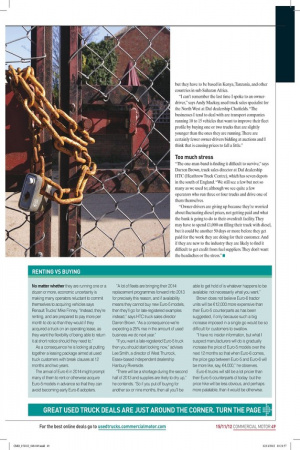A dying breed?
Page 38

Page 39

If you've noticed an error in this article please click here to report it so we can fix it.
Economic woes mean there are fewer customers and start-up businesses buying used trucks, forcing up the likelihood of exporting unwanted stock
Words: Steve Banner Tough economic times and financial constraints mean that fewer owner-drivers – the traditional customers for used trucks – are in the market for second-hand tractor units.
So says Mike Finney, general manager of used vehicles at Renault Trucks: and if they cannot afford a secondhand one, they are certainly not going to be in a position to buy a brand-new model.
Finney believes that what the industry is witnessing is the steady demise of the self-employed haulier who owns and drives his own vehicle. “Dealers are seeing fewer drivers coming in and saying ‘I want to set up on my own’,” he reports.
Poor rates for haulage work, the difficulties start-up businesses experience when it comes to obtaining finance and the lack of growth in the economy might be making drivers think twice about working for themselves.
“Until recently a truck salesman who had been doing the job for, say, 10 or 15 years would have a good customer base of owner-drivers that he could rely on but that’s now no longer the case,” Finney says. “I suspect that many owner-drivers have either retired or packed in running their own vehicle, and now work for one of the bigger companies as an employee. OK, it means you’re no longer your own boss, but at least you get to enjoy benefits such as holiday pay.” Of the owner-drivers who remain, many derive most of their income from a single large customer and act as permanent sub-contractors in effect, says Finney. Sometimes this can work well, with the subbie enjoying a reliable source of work and income. Sometimes it can prove problematic, with rate cuts suddenly being imposed without discussion and work drying up equally as suddenly.
Overseas business
So what’s happening to the second-hand trucks that those rapidly vanishing owner-drivers would have bought?
“In many cases they’re being exported,” says Finney. “Every used truck dealer in the country seems to be an exporter now, and those exports must be earning the country a significant amount of foreign currency. I would estimate that the UK probably exports between 10,000 and 15,000 second-hand trucks annually, with the three biggest exporters alone shipping out 2,500 between them.” Those trucks might still be acquired by owner-drivers – but they have to be based in Kenya, Tanzania, and other countries in sub-Saharan Africa.
“I can’t remember the last time I spoke to an ownerdriver,” says Andy Mackay, used truck sales specialist for the North West at Daf dealership Chatfields. “The businesses I tend to deal with are transport companies running 10 to 15 vehicles that want to improve their fleet profile by buying one or two trucks that are slightly younger than the ones they are running. There are certainly fewer owner-drivers bidding at auctions and I think that is causing prices to fall a little.”
Too much stress
“The one-man-band is finding it difficult to survive,” says Darren Brown, truck sales director at Daf dealership HTC (Heathrow Truck Centre), which has seven depots in the south of England. “We still see a few but not so many as we used to; although we see quite a few operators who run three or four trucks and drive one of them themselves.
“Owner-drivers are giving up because they’re worried about fluctuating diesel prices, not getting paid and what the bank is going to do to their overdraft facility. They may have to spend £1,000 on filling their truck with diesel, but it could be another 50 days or more before they get paid for the work they are doing for their customer. And if they are new to the industry they are likely to find it difficult to get credit from fuel suppliers. They don’t want the headaches or the stress.” ■
RENTING VS BUYING
No matter whether they are running one or a dozen or more, economic uncertainty is making many operators reluctant to commit themselves to acquiring vehicles says Renault Trucks’ Mike Finney. “Instead, they’re renting, and are prepared to pay more per month to do so than they would if they acquired a truck on an operating lease, as they want the flexibility of being able to return it at short notice should they need to.” As a consequence he is looking at putting together a leasing package aimed at used truck customers with break clauses at 12 months and two years.
The arrival of Euro-6 in 2014 might prompt many of them to rent or otherwise acquire Euro-5 models in advance so that they can avoid becoming early Euro-6 adopters. “A lot of fleets are bringing their 2014 replacement programmes forward into 2013 for precisely this reason, and if availability means they cannot buy new Euro-5 models, then they’ll go for late-registered examples instead,” says HTC truck sales director Darren Brown. “As a consequence we’re expecting a 25% rise in the amount of used business we do next year.” “If you want a late-registered Euro-5 truck then you should start looking now,” advises Lee Smith, a director of West Thurrock, Essex-based independent dealership Hanbury Riverside.
“There will be a shortage during the second half of 2013 and supplies are likely to dry up,” he contends. “So if you put off buying for another six or nine months, then all you’ll be able to get hold of is whatever happens to be available: not necessarily what you want.” Brown does not believe Euro-6 tractor units will be €12,000 more expensive than their Euro-5 counterparts as has been suggested, if only because such a big increase imposed in a single go would be so difficult for customers to swallow.
“I have no insider information, but what I suspect manufacturers will do is gradually increase the price of Euro-5 models over the next 12 months so that when Euro-6 comes, the price gap between Euro-5 and Euro-6 will be more like, say, €4,000,” he observes.
Euro-6 trucks will still be a lot pricier than their Euro-5 counterparts of today: but the price hike will be less obvious, and perhaps more palatable, than it would be otherwise.









































